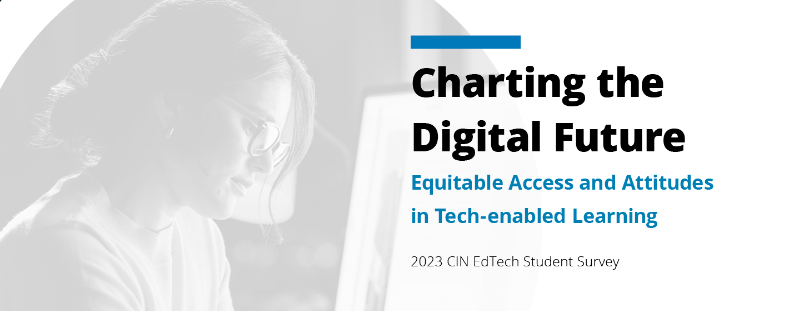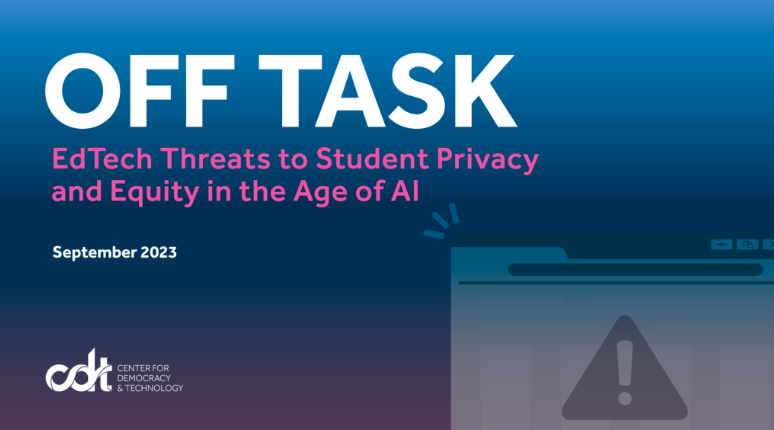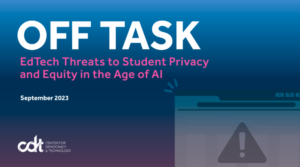Americans are experiencing a crisis of faith toward higher education leaders and do not fully trust them to prioritize their students, a new survey from U.S. News & World Report and The Harris Poll shows. The results were revealed December 12 at an exclusive event, “The Evolution of Leadership: Education”. U.S. News – the global authority in education rankings and consumer advice – convened more than 125 education thought leaders, college presidents and government officials in New York for a discussion on crucial topics shaping the future of higher education.

Wendy Salomon, managing director of corporate strategy & reputation at The Harris Poll, presented the survey’s results. Among the key findings:
- Fifty-eight percent of Americans believe that university leaders are failing students today, while 53% of current Gen Z and Millennials believe the same thing.
- Only 43% of Americans and 45% of Gen Z and Millennials believe that universities are succeeding in developing leaders of tomorrow.
- Fifty-six percent of Americans think that university leaders are not good examples of leaders for their students.
- Only 45% of Americans trust university leaders to do the right thing for their students. However, 57% of Gen Z and Millenials trust university leaders to do the right thing for their students.
- As for Americans’ trust in their university leaders to prioritize their students:
- 59% of Americans trust public university leaders
- 55% of Americans trust private university leaders
- 51% of Americans trust ivy university leaders
“We know that important work has had to be undertaken in an increasingly difficult environment in this country where we are seeing declining levels of trust in our academic institutions, as well as decreasing enrollment numbers today where high school students are increasingly electing not to go to college,” Eric Gertler, U.S. News executive chairman and CEO, told attendees. “These last two months have made one’s role as president of a university infinitely more difficult. Leadership has never been easy – especially in times of crisis. But that is what we expect and demand from those in these positions of leadership.”
“Today we aim to share those learnings of leadership with a group of some of the most respected thinkers and leaders in academia – and for that we are truly privileged to be having those conversations,” Gertler added.
The two-hour forum also featured sessions on higher education policy, leading outside of the box, and the evolution of leadership in education. Additional speakers included James Kvaal, under secretary of the U.S. Department of Education; John B. King Jr., chancellor, The State University of New York, and 10th U.S. secretary of Education; Mildred Garcia, chancellor, California State University; Jonathan Koppell, president, Montclair State University; and Ari Berman, president, Yeshiva University.
The survey was conducted online within the U.S. by The Harris Poll, December 8-10, 2023, among a nationally representative sample of 2,031 U.S. adults.
The College Innovation Network (CIN), a grant-funded initiative spearheaded by WGU Labs, today published the results of its 2023 CIN Student EdTech Survey. The third annual survey provides new critical insights into the role technology plays in facilitating equitable access to quality higher education. The survey finds both opportunities and challenges in the tech-enabled future of higher education – particularly for first-generation college students.
The survey, which included 3,143 students from nine diverse community colleges, private and public four-year universities, and online, not-for-profit colleges across the country, found that an impressive 84% of students have access to necessary digital devices, and 78% enjoy reliable internet access, signaling a shrinking digital divide. However, a growing concern is “tech fatigue:” Almost 60% of students indicated a need for a break from educational technology. And notably, first-generation students are less acquainted with advanced AI tools like ChatGPT.

The CIN Student EdTech Survey identified four key takeaways for institutions to improve the student EdTech experience:
- First-generation college students exhibit a nearly 10% higher inclination towards online learning. This demographic, often facing numerous economic and social barriers, views technology as a conduit to more accessible and flexible education, underscoring the necessity for tech-driven educational models.
- While tech access and digital literacy are advancing, two-thirds of students express tech fatigue. Addressing the AI access gap between first-generation and continuing-generation students is imperative.
- Over 80% of students affirm the effectiveness of online courses. However, a preference for in-person learning persists, highlighting the need for quality enhancements in digital education.
- 80% of students, particularly first-generation learners, affirmed that technology eased access to crucial educational supports like tutoring and mental health services. However, actual utilization remained low, underscoring the need for increased awareness and better engagement strategies.
“We are encouraged by the overwhelmingly positive sentiment toward tech-enabled learning, especially from first-generation students,” said Omid Fotuhi, Director of Learning Innovation at WGU Labs. “This is an encouraging signal toward the democratization of higher education.”
The 2023 CIN Student EdTech Survey highlights an imminent tech-driven educational future. The insights gleaned underscore the urgency for higher education institutions to craft a tech-integrated educational landscape as inclusive as it is innovative, ensuring every student, irrespective of their background, has an equitable pathway to quality education.
“To fully realize the potential of advanced tools like AI in shaping the future of education, we must address challenges like tech fatigue and disparities in access for all students,” Fotuhi said. “Integrating comprehensive, tech-enabled strategies is essential to ensuring an inclusive, equitable, and effective learning environment.”
For a full analysis of the survey findings and actionable strategies to improve student experiences with EdTech, please visit www.wgulabs.org/posts/charting-the-digital-future-student-edtech-survey-cin-2023.
The Center for Democracy & Technology (CDT) has released new survey results and legal research revealing that new and long-standing technologies used in schools continue to harm student privacy and equity, but schools have the power to use existing civil rights laws to identify and prevent discrimination on the basis of race, sex, and disability.
Amid high and increasing levels of parental concern about school data practices, the survey report highlights how technologies such as online monitoring and content filtering and blocking software are increasing students’ encounters with law enforcement and other disciplinary actions — often resulting in disparate impacts on the basis of race, sex, and disability. The results also show a lack of school guidance on responsible use of generative AI, despite its quick emergence in education.

“For the second year in a row, we found that schools are failing to use technologies in responsible ways that respect students’ rights. Students, parents, and teachers must have a voice — and receive support — in ensuring the responsible use of technology in schools,” says CDT President and CEO Alexandra Reeve Givens. “The Department of Education has the authority to clarify, provide guidance, and enforce decades-old civil rights protections to the use of technology in schools. As we approach the one-year anniversary of the White House’s Blueprint for an AI Bill of Rights, now is the time to act.”
CDT’s new survey research shows that:
- 50% of teachers think content filtering and blocking software is stifling students’ growth;
- Two-thirds say that students got in trouble as a result of AI-driven student activity monitoring, or in reaction to being confronted about a monitoring alert;
- 38% of teachers report that they know a student who has been contacted by law enforcement because of online monitoring; and
- 50% say that they know of students who have gotten in trouble for using generative AI.
“What’s disheartening is that another year has gone by, and students at Title I schools, students with disabilities, and LGBTQ+ students continue to bear the brunt of irresponsible data and technology use and policies in the classroom and at home,” says Elizabeth Laird, Director of the Equity in Civic Technology Project at CDT. “This is alarming given that schools say they use technologies to keep all students safe and enhance their learning experience. As students enter the age of AI, they need better from their schools.”
CDT’s findings reveal that Title I and licensed special education teachers are more likely to report that their schools filter and block online LGBTQ+ and race-related content, amounting to a digital book ban. Additionally, LGBTQ+ students report being disciplined more than their peers as a result of student activity monitoring, and licensed special education teachers report that their students face higher incidents of law enforcement contact. CDT’s legal research report shows that common discrimination claims that have historically been made against schools are very much relevant and applicable to uses of technology, both old and new.
In response to CDT’s new survey research and legal analysis of the Department of Education’s ability to address civil rights harms resulting from technologies, a coalition of high-profile civil society organizations have sent a letter calling for the U.S. Department of Education to issue guidance on how schools can identify and prevent discrimination against protected classes of students. The letter was sent to the U.S. Secretary of Education, the Director of the White House Office of Science and Technology Policy, and copied numerous White House officials leading the Biden Administration’s work on AI and civil rights.
The coalition letter has so far been signed by: American Association of School Librarians (AASL), American Civil Liberties Union (ACLU), American Library Association (ALA), Autistic Self Advocacy Network (ASAN), Bazelon Center for Mental Health Law, Center for Learner Equity, Council of Parent Attorneys and Advocates (COPAA), Disability Rights in Education Defense Fund (DREDF), Educating All Learners Alliance, Electronic Frontier Foundation (EFF), Electronic Privacy Information Center (EPIC), Fight for the Future, GLSEN, I Vote for Me, InnovateEDU, LGBT Tech, National Center for Learning Disabilities (NCLD), and Next Century Cities.
Last year, CDT sent a letter to the U.S. Department of Education raising similar concerns about ways that educational technologies potentially infringe on civil rights.The research report was generated based on nationally representative surveys of teachers, parents, and students. You can access the full text of the research report and summary brief here and the full text of the legal research report here.

